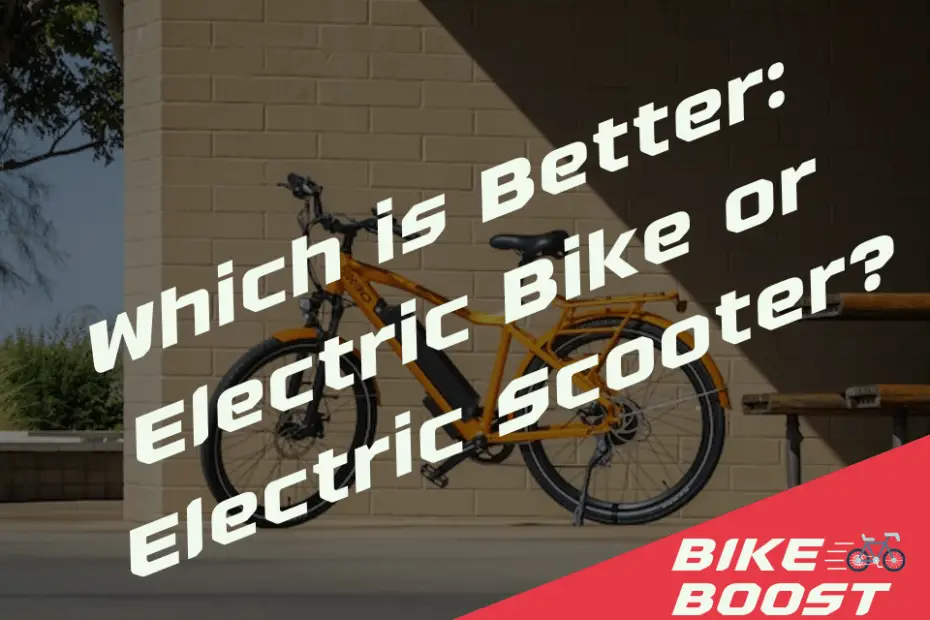We love writing these guides for you and sometimes we are compensated when you use one of our links to buy a product. This doesn’t impact the final price you pay. If you want to learn more about how this works, please see our Affiliate Disclosure page.
When it comes to personal transportation options, the market has expanded significantly in recent years. With the rise of eco-friendly alternatives, electric bikes and electric scooters have gained immense popularity. Both offer a convenient and sustainable way to travel short distances without relying on traditional gasoline-powered vehicles. But which one is better suited to your needs? In this article, we’ll delve into the world of electric mobility and explore the merits of electric bikes and electric scooters.
Key Takeaways:
- Consider your preferences, intended usage, and local regulations when choosing between an electric bike and an electric scooter.
- Electric bikes offer versatility, exercise benefits, and higher speeds, making them suitable for longer distances and faster rides.
- Electric scooters are more compact, portable, and maneuverable, ideal for urban commuting with a focus on convenience.
Understanding Electric Bikes
Let’s begin with electric bikes. Also known as e-bikes, these innovative vehicles combine the convenience of a bicycle with the assistance of an electric motor. E-bikes feature a battery-powered motor that provides pedal assistance, making it easier to navigate hills and cover longer distances. But can you turn your regular bike into an electric bike? The answer is yes! With the right conversion kit, you can transform your beloved bicycle into an efficient and eco-friendly e-bike. Check out our guide on Can I Turn My Bike Into an Electric Bike? to learn more.
Exploring Electric Scooters
Now let’s shift our focus to electric scooters. These compact and nimble vehicles have become a common sight on city streets. Electric scooters are propelled by an electric motor and are typically designed for short commutes and urban exploration. They offer a fun and efficient mode of transportation for individuals seeking an alternative to cars or public transit. But can you charge an e-bike while riding? Find out the answer and discover some helpful tips in our comprehensive guide on Can You Charge an E-Bike While Riding?.
Benefits and Considerations
Now that we have a basic understanding of both electric bikes and electric scooters, let’s delve deeper into the benefits and considerations of each option. Keep in mind that regulations regarding electric mobility devices may vary depending on your location. For instance, can you ride an electric bike on the sidewalk? Explore the rules and guidelines in our informative article on Can I Ride an Electric Bike on the Sidewalk?.
When it comes to electric bikes, one of the key advantages is their versatility. These bikes allow you to enjoy the benefits of exercise while providing electric assistance when needed. Have you ever wondered how many calories you can burn on an electric bike? Discover the answer and learn about the health benefits in our dedicated guide on How Many Calories Do You Burn on an Electric Bike?.
On the other hand, electric scooters offer a compact and agile mode of transportation. They are ideal for navigating congested city streets and quickly zipping through traffic. But can you drive electric bikes on the road? Get acquainted with the regulations and roadworthiness requirements in our comprehensive article on Can You Drive Electric Bikes on the Road?.
Maintenance and Charging
As with any mode of transportation, maintenance and charging play a crucial role in ensuring the longevity and efficiency of electric bikes and electric scooters. Understanding how electric bikes work is essential to keep them running smoothly. Dive into the technical details and inner workings of e-bikes in our informative guide on How Electric Bikes Work.
When it comes to charging, knowing the best practices can make a significant difference. How often should you charge your electric bike? Find out the optimal charging frequency and learn valuable tips to maximize battery life in our detailed article on How Often to Charge Electric Bike. Additionally, if you’re wondering how to charge your electric bike at home, we have a step-by-step guide just for you. Check out How to Charge Electric Bike at Home for all the essential information.
Making the Right Choice
Now that you have a comprehensive understanding of electric bikes and electric scooters, you may be wondering which option is right for you. Choosing the perfect electric bike or electric scooter depends on various factors such as your commuting needs, lifestyle, and personal preferences. Explore our guide on What Electric Bike Should I Get? to gain valuable insights and tips to assist you in making an informed decision.
Insurance and Legal Considerations
When it comes to owning an electric bike or electric scooter, it’s essential to understand the insurance and legal aspects associated with these vehicles. Insuring your electric bike can provide you with peace of mind and financial protection in the event of theft, damage, or accidents. Discover the ins and outs of electric bike insurance in our comprehensive guide on How to Insure an Electric Bike.
It’s also crucial to familiarize yourself with the laws and regulations pertaining to electric bikes and electric scooters in your area. While some regions classify them as bicycles, allowing them on bike lanes and paths, others may require riders to adhere to specific speed limits and road regulations. Stay informed and ensure you’re aware of the rules by reading our informative article on Can Electric Bikes Get Wet?
Starting and Riding Experience
If you’re new to electric bikes or electric scooters, you might be wondering how to get started and what to expect from the riding experience. Fortunately, we have you covered. Our guide on How to Start an Electric Bike provides step-by-step instructions to help you smoothly kickstart your electric bike adventures. From turning on the battery to engaging the motor, we’ll walk you through the process.
When it comes to riding experience, both electric bikes and electric scooters offer unique sensations. Electric bikes allow you to enjoy the benefits of traditional cycling while providing assistance when needed. On the other hand, electric scooters offer a more laid-back and effortless ride. Consider your comfort, handling preferences, and desired level of physical activity to determine which option suits you best.
Performance and Speed
Performance and speed are crucial factors to consider when deciding between an electric bike and an electric scooter. Electric bikes typically have a higher top speed compared to electric scooters, thanks to their pedal-assist feature. However, the speed may vary depending on the model and local regulations. For those seeking an adrenaline rush, you might be curious about the fastest electric bicycles available. Explore our article What Is the Fastest Electric Bicycle? to satisfy your need for speed.
Electric scooters, on the other hand, are designed for urban commuting and typically offer moderate speeds. While they may not reach the same velocity as electric bikes, their compact size and maneuverability make them ideal for navigating through city traffic and crowded areas.
Addressing Common Concerns
As with any form of transportation, electric bikes and electric scooters may encounter occasional issues or concerns. One common problem that riders may face is their electric bike cutting out unexpectedly. If you’re experiencing this issue or simply want to be prepared, our article on Why Is My Electric Bike Cutting Out? offers insights into potential causes and troubleshooting tips to keep your ride smooth and uninterrupted.
Making the Right Choice
Choosing between an electric bike and an electric scooter ultimately depends on your personal preferences, needs, and intended usage. To assist you in making the right choice, let’s recap some key points we’ve explored throughout this article:
- Versatility and Exercise: Electric bikes provide the option of pedaling, allowing for exercise and the ability to tackle longer distances. If you enjoy cycling and want the flexibility of both electric and manual power, an electric bike might be the better choice. However, if you prefer a more relaxed and effortless ride, an electric scooter could be more suitable.
- Portability and Maneuverability: Electric scooters are generally more compact and lightweight, making them easier to carry and maneuver in crowded urban areas. If you frequently navigate through busy streets or need a portable mode of transportation, an electric scooter might be the ideal option.
- Speed and Performance: Electric bikes, with their pedal-assist feature, offer higher top speeds and are better suited for longer distances and faster rides. If speed is an important factor for you, an electric bike may be the way to go. On the other hand, electric scooters excel in urban environments, providing efficient and nimble commuting without the need for high speeds.
- Legal Considerations: It’s crucial to understand the local laws and regulations regarding electric bikes and electric scooters in your area. Some regions may classify them differently, with specific restrictions and requirements. Ensure you are aware of the legalities and adhere to them for a safe and compliant riding experience.
Further Resources
To dive deeper into the world of electric bikes and electric scooters, here are some additional resources available on our website, bikeboost.org:
- How Electric Bikes Work: Gain a comprehensive understanding of the inner workings of electric bikes, from batteries and motors to controllers and sensors.
- How Many Calories Do You Burn on an Electric Bike?: Discover the surprising health benefits of riding an electric bike and how it can contribute to an active lifestyle.
- How Often to Charge an Electric Bike: Learn about the best practices for charging your electric bike’s battery to ensure optimal performance and longevity.
Conclusion
In the battle between electric bikes and electric scooters, there is no definitive winner. The decision ultimately rests on your individual preferences, lifestyle, and requirements. Consider factors such as versatility, portability, speed, and legal considerations when making your choice.
FAQs
Are electric bikes faster than electric scooters?
Electric bikes generally offer higher top speeds due to their pedal-assist feature, making them better suited for longer distances and faster rides.
Can I ride an electric bike on the sidewalk?
The rules regarding riding electric bikes on sidewalks vary by location. It’s essential to familiarize yourself with the local regulations to ensure a safe and legal riding experience.
How often do I need to charge an electric scooter?
The frequency of charging an electric scooter depends on factors such as battery capacity and usage. It’s recommended to follow the manufacturer’s guidelines for optimal performance.
Can I turn my regular bike into an electric bike?
Yes, it is possible to convert a regular bike into an electric bike using conversion kits available in the market. These kits include a motor, battery, and other necessary components.
What are the legal considerations for electric bikes and electric scooters?
It’s important to understand the local laws and regulations regarding electric bikes and electric scooters, including age restrictions, speed limits, helmet requirements, and where they are allowed to be ridden.
How do electric bikes and electric scooters contribute to reducing emissions?
Both electric bikes and electric scooters are eco-friendly alternatives to traditional gas-powered vehicles, as they produce zero emissions during operation, reducing air pollution and carbon footprint.
Andy is an avid cyclist who enjoys nothing more than a ride out in the hills. Competing in track, road, time trial and mountain bike events in the past, he prefers slower rides out with his family these days.

